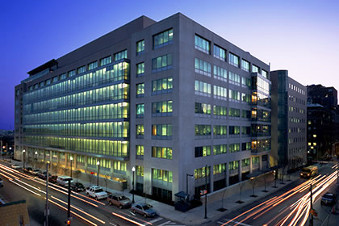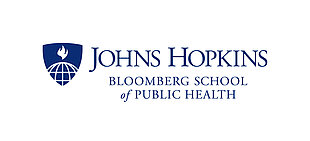1. Brief History
Johns Hopkins Bloomberg School of Public Health is not only the first institution of its kind in the world, but also the largest school of public health globally. The school, which is a fully accredited private institution, is located in Baltimore, Maryland, USA.
The institution’s name comes from Johns Hopkins, a man who created corporations for a university and a hospital, and upon his death left 7 million dollars for their development. At the time, this was an extremely notable philanthropic endeavor. The university was founded in 1876. Following a grant from the Rockefeller Foundation in 1916, the Johns Hopkins School of Hygiene and Public Health was founded by William H. Welch. The institution aimed to balance practical public health training with scientific research. This model was later used for the creation of other public health schools not only across the country, but around the world. The institution’s name was later altered to Johns Hopkins Bloomberg School of Public Health as a means to recognize Michael Bloomberg and his generous contributions to the school.
The school is currently thriving. They are the recipients of a fifth of all the grants and contracts awarded to American Public Health schools. In fact, the school is deemed to be, by the US News & World Report, the top public health school.
The Johns Hopkins mission is “to educate its students and cultivate their capacity for life-long learning, to foster independent and original research, and to bring the benefits of discovery to the world.”
Outstanding Persons:
There have been over 30 Nobel Laureates affiliated with Johns Hopkins University. The following people received Nobel Prizes within the category of Medicine:
- Thomas Hunt Morgan (1933)
- George Minot (1934)
- George Whipple (1934)
- Joseph Erlanger (1944)
- Herbert Spencer Gasser (1944)
- Francis Peyton Rous (1966)
- Haldan Keffer Hartline (1967)
- Daniel Nathans (1978)
- Hamilton O. Smith (1978)
- David H. Hubel (1981)
- Torsten N. Wiesel (1981)
- Martin Rodbell (1994)
- Paul Greengard (2000)
- Richard Axel (2004)
- Andrew Fire (2006)
- Carol Greider (2009)
Notable Alumni:
- Leroy Edgar Burney, First to identify cigarette smoke as the cause of lung cancer
- Virginia Apgar, Founded the field of Neonatology
- Alexander Langmuir, Founded the Epidemic Intelligence Service
- Miriam Were, Recipient of the Légion d’honneur and the Hideyo Noguchi Africa Prize
- António Correia de Campos, European Parliament and former Health Minister of Portugal
- Donald A. Henderson, Presidential Medal of Freedom
- Peter Pronovost, Time 100

2. Key Facts
Established:
1916
Type:
Private
Structure:
The Johns Hopkins Bloomberg School of Public Health is one among nine schools at the Johns Hopkins School. The latter includes more than 60 centers and institutes. The school comprises ten departments:
- Biochemistry and Molecular Biology
- Biostatistics
- Environmental Health Sciences
- Epidemiology
- Health, Behavior and Society
- Health Policy and Management
- International Health
- Mental Health
- Population, Family and Reproductive Health
- W. Harry Feinstone Department of Molecular Microbiology and Immunology
Staff:
619 Faculty full time and 685 part time
Students:
2,000 students from about 90 nations
Endowment:
US $360 million
3. Research
Focus / Key Aspects:
The school has over 60 centers and institutes, providing the university with strong health research. Among these are:
- Malaria Research Institute
- International Injury Research Unit
- International Center for Maternal & Newborn Health
- Centre for AIDS Research
- Autoimmune Disease Research Center
- Bill and Melinda Gates Institute for Population and Reproductive Health
- Center for Sexually Transmitted Diseases Research, Prevention and Training
- Center for Clinical Global Health Education
- The John Hopkins University Global Health Initiative
- Welch Center for Prevention, Epidemiology and Clinical Research
Affiliated Programs include the following:
- Johns Hopkins Project SAVE
- Johnson & Johnson Community Health Program
- Program on Global Sustainability & Health
- Asian American Cancer Program
- Korean American Cancer Project in Maryland
- Johns Hopkins Fetal Development Project
- Multicenter AIDS Cohort Study
- AIDS linked to the Intravenous Experience (ALIVE)
Full list of the Centers and Institutes within Johns Hopkins Bloomberg School of Public Health
Research projects are conducted by professors in over 130 countries globally.
4. Partnerships and Programs
Partner Universities and Affiliations:
A comprehensive list of the numerous international cooperations if available at the Johns Hopkins Bloomberg School of Public Health website
Student Programs:
The Student Assembly provides students with the opportunity to represent their peers and promote the student voice at their school. Student groups are centered on health concepts and focus on either a specific cultural group or a distinctive facet of health. The School encourages students to become involved in public health practice to experience the sector firsthand. Students may gain this experience through organized internship programs, practice-based academic courses or independent projects.
5. Trivia
Motto:
Protecting Health, Saving Lives - Millions at a Time
Miscellaneous:
Several buildings on campus collect and utilize solar power, lowering the university’s environmental impact and rendering its practices more sustainable.

